- Home
- John Bellairs
Drum, the Doll, and the Zombie
Drum, the Doll, and the Zombie Read online
The Drum, The Doll, and The Zombie
A Johnny Dixon Mystery: Book Nine
John Bellairs
For Jeanne Sharp, one of Johnny's best friends
B.S.
CHAPTER ONE
"Charley, I'm throwing this shindig for you. Now start having a good time, or I'll boot you out into the storm!" grumbled Professor Roderick Childermass. He was a short, elderly man with a nest of white hair, wildly sprouting white muttonchop sideburns, and a pitted red strawberry of a nose. The professor stood before a fireplace in his living room. Sitting on the brick hearth with their backs to the crackling fire were Johnny Dixon and his friend Byron Ferguson, and hunched miserably in an armchair was Dr. Charles Coote, the object of the professor's scorn.
A specialist in the folklore of magic who taught at the University of New Hampshire, Dr. Coote was a tall, reedy man of about seventy, his head crowned with fluffy white hair and his long, bent nose supporting thick, horn-rimmed bifocal glasses. "I'm sorry, Roderick," he muttered. "I'm afraid I haven't exactly been the life of the party tonight."
"The death of the party is more like it," snorted Professor Childermass in his abrupt way. "Right, boys?"
Johnny and Byron exchanged glances. Both were about thirteen. Johnny was short and blond, and wore glasses; Byron—who preferred to be called Fergie—was taller and more athletic, with jug ears, curly black hair, a droopy face, big feet, and a devil-may-care attitude. For a moment after the professor's challenge, the two friends just looked at each other. Johnny did not like taking sides in a disagreement between adults, but Fergie grinned and jumped right in. "You said it, Prof," he agreed. "Even before this storm started, the doc was a regular wet blanket."
It was nine o'clock in the evening of a late-September Saturday during the mid-1950s. An equinoctial gale had blown into Duston Heights, Massachusetts, at sunset, and now a dismal wind howled outside as a cold, pelting rain rattled the windows. The nor'easter had brought chilly temperatures, and the professor's first fire of the season was a welcome defense against the cool and the damp.
Dr. Coote sighed deeply. "I am sorry if I'm spoiling everyone's good time," he said. He took a sip from his mug of spiced cider, and his glasses fogged from the vapor. He appeared not to notice. "The truth is, I've been jumpy ever since coming back from New Orleans two weeks ago. Something rather odd happened to me there, and I have yet to figure out what it meant."
Setting his empty mug on the mantel, the professor leaned against the chimney and lit one of his black-and-gold Balkan Sobranie cigarettes. "Well, spill it, Charley. You are among friends here. This storm is too brutal for you to drive back to New Hampshire anyway, and I obviously have to offer you a bed for the night. If I must share my house with you, I simply will not have you moping around like a Gloomy Gus. So you might as well tell us your story."
"Yeah," said Fergie, who had just finished his second slice of the professor's famous German chocolate cake. "Tell us, Doc, what happened 'way down yonder in New Orleans? Ya get chased through the bayous by Albert the Alligator?"
Johnny felt sorry for Dr. Coote, who merely smiled in a mildly pained way at Fergie's little joke. Dr. Coote was a timid soul, not at all like the bombastic Professor Childermass, who terrified practically everyone in Duston Heights with his prickly personality and explosive mannerisms. However, over the past several years Johnny had come to know and like the cranky old man, who had a warm heart beneath his gruff exterior.
Johnny's mother had died some time before. His father, who was a veteran bomber pilot, had rejoined the Air Force to fly fighter planes when the Korean War broke out. Because of that, Johnny had moved from New York State to Duston Heights, where he lived with his grandparents across from Professor Childermass on Fillmore Street. The Korean War had recently ended, but the Air Force needed Johnny's dad to train pilots for the Strategic Air Command. Since the assignment involved a lot of travel, Major Dixon saw Johnny only a couple of times a year. The rest of the time Johnny spent with his grandparents, or with Fergie, or with Professor Childermass and his few friends.
Dr. Coote coughed self-consciously and finished the last of his hot cider. "I know the story sounds silly," he murmured. "And yet the incident has preyed on my mind in, well, a most unpleasant way. It all began when I traveled to New Orleans to attend the annual meeting of the North American Folklorists' Association. The conference took place from Thursday morning through Sunday noon. You know how these academic conferences are, Roderick—"
"Indeed I do," growled Professor Childermass, his eyes glittering behind his rimless spectacles. "Pack of pompous old fools reading gassy essays to each other and telling one another how smart they are. The worst of it is they think they're all having such a marvelous, interesting, informative good time. Phooey on that! Give me a good old Red Sox baseball game any day of the week!"
"Well—I think if you are to understand the story, I had better show you something. It's just outside in my car." Dr. Coote went to the front closet, where he retrieved his comfortably worn camel's-hair topcoat. He bundled into it and clapped on his battered homburg. Then he dashed into the storm. In a moment he was back, holding a brown paper bag that the rain had already soaked. He set it down before the fire and shrugged out of his coat. "Heavens, but the wind is ferocious! Are you boys going to be all right?"
"Uh—sure," answered Johnny, his gaze on the wet paper bag.
"Of course they are," said Professor Childermass. "Byron is spending the night with John. Stop stalling, Charley. What happened at this pretentious academic conference that's got you as spooked as a lone kitty-cat lost in a dog kennel?"
"I was, ah, coming to that," said Dr. Coote. He sank into his chair again, removed his rain-spattered spectacles, and fished a crumpled handkerchief from his side pocket to polish them. "Well, everything went all right until Saturday evening, just two weeks ago tonight. At seven, I took part in a panel discussion about Caribbean folklore research. Somehow or other we got onto the voodoo cults of Haiti and St. Ives, and I am afraid I sounded off a bit. You know, I have done some research preparatory to writing a book on the subject, and—"
"Yes, we know how brilliant you are," interrupted Professor Childermass rudely. "Get to the point! What happened?"
Dr. Coote coughed and replaced his glasses. "Well, at the end of the session, a young man came up to me. He told me he was from the island of St. Ives, and that I had several points exactly right, but that others needed clarifying. 'Above all,' he said, with a frightened look around him, 'you must discover how to deal with the Sect of the Baron. You must learn how to defeat the terrible Priests of the Midnight Blood. You must beware of the walking dead. And whatever you do, you must take this and destroy it if you can!' " With a shudder Dr. Coote picked up his mug, only to discover that it was empty. He took a deep breath. "Then the young fellow handed me the article that is in that paper bag, and he melted away into the crowd. I tried to follow, but he lost me."
Professor Childermass tossed the stub of his cigarette into the fire. "And what was this booby prize? Johnny, you are closest. Open it, if you please."
"Sure, Professor!" Johnny had been itching to know what lay inside the sodden paper bag. He tore away the paper and pulled out a strange little drum that was shaped like a Dixie cup, tapering from top to bottom, although it was larger than a paper cup. The drum was about four inches across at the head and three inches at the bottom. Its head and bottom covering were both of some odd, pebbled leather, the color a deep olive green streaked with yellow and dark-brown stripes. The body of the drum was smooth black wood, carved all in one piece. Red leather thongs tied the drumhead down, running in a zigzag line all around the drum, their ends wound around the
ends of small white bones. Other thongs tied to the lower ends of the bones held the bottom covering taut. Between the bones red, green, gray, blue, and white circles had been painted on the body of the drum. Each circle held an emblem: a grinning white skull, a black top hat, a wriggling green snake, a yellow bolt of lightning, and a red drop of blood with a teardrop-shaped white highlight.
"For heaven's sake," said the professor, taking the drum from Johnny and turning it this way and that as he looked at it. "Don't tell me this is what gave you the jitters! Why, you can order one just like this from the Montgomery Ward catalogue. It comes with a feather headdress, your very own bow, and a quiver full of rubber-tipped arrows!"
"Oh, indeed?" asked Dr. Coote with a sickly smile. "Tell me, Roderick, does the Montgomery Ward drum include a set of five phalanges? Because that is exactly what those five little white bones are—human finger and thumb bones!"
Fergie jumped up. "Neat-o!" he said. "Hey, Prof, can I take a gander?" Professor Childermass handed him the drum, and Fergie touched the bones one by one, as if he were counting them. He sank back down on the floor in front of the fireplace. "Look, John baby," he said, "real human fingers!"
Johnny regarded the bones curiously. Now he could see that they tapered to delicately rounded ends. Yes, they could very well be the finger and thumb tips of some unlucky person. However, the news did not excite him as it did Fergie. Instead, it made Johnny's stomach feel queasy.
Professor Childermass was scowling. He hated it when anyone showed him up, and he especially hated to have some choice bit of sarcasm turned against him. With a splutter, he began, "Now see, here, Charley, even if those really are human bones—"
"That they are, Roderick," said Dr. Coote, sounding mildly exasperated. "I had an expert at the university take a good look at them. And don't say they must be fakes or fossils. They are genuine bones, and they come from someone who was killed—or at least who lost his hand—relatively recently, within the last century or so."
The frown deepened on the professor's face. "As I was about to say, even if these bones are—ahem!—bona fide, they cannot possibly harm you. I'll admit I've heard of vengeful ghosts returning to haunt people who did them wrong. Still, I have never heard of—of a one-handed ghost out to collect his missing whatchamacallits."
"Phalanges," said Dr. Coote helpfully.
The professor's face got red. "Phalanges! All right, drat all punctilious pedagogues, phalanges! Whatever they are, they cannot hurt you, and that is my point. They are simply lifeless bits of bone."
Dr. Coote shrugged. "I am not afraid of dry bones, Roderick. I may be more, ah, cautious than you, but I am not a superstitious fool. No, the symbols painted on the drum disturb me more than the bones do. They are emblems of Baron Samedi, the Lord of the Dead, and of his cult. The cult must be the Sect of the Baron. That much is obvious. Aside from that, I am in the dark. I have never read anything about the Midnight Blood priests. But what really bothers me is that I don't know anything in voudon that has to do with this drum, and I should."
"And what in thunder is voudon?" asked Professor Childermass.
Dr. Coote leaned forward in his chair, clasping his hands before him. "I must explain that most scholars have never studied the St. Ives branch of voodoo. Many have never even heard of it. St. Ives is a tiny Caribbean island with a population of only a few thousand, all descended from French planters who fled from Haiti during a slave rebellion in 1791. Curiously, the French took with them the superstitions and magical practices of the slaves. Today almost no outsiders visit the island because it is not on the regular tourist routes, and getting there is a real problem. The people are very secretive. Their rulers are bocors, or priests, of the local voodoo cult, which they call voudon. I spent one summer on the island, just after World War II. Since then I have published the only articles about their particular brand of evil voodoo magic."
"Yes, and you are writing a book about it too," said the professor with a smirk. "Charley, you and I have discussed this before, and you are being inconsistent. As I recall, your opinion was that voodoo is mostly a religion, no more evil than Unitarianism or Shakerism or any other sect."
Dr. Coote shrugged his thin shoulders. "True, but wicked human nature may corrupt any religion and turn it to evil purposes. Just think of the jihads, or holy wars, of Islam. For that matter, think of the poor innocent people your very own Catholic church burned as heretics in the Middle Ages."
"No argument there," agreed the professor. "Although, as you say, such terrible events occur more because of people corrupting the doctrines of the church than because of true religious principles."
"Well, the same is true of voodoo," said Dr. Coote. "Most of it appears harmless. Much of it is simply a survival of African religions, with some borrowings from Catholicism and other creeds. However, the voudon cult of St. Ives is a terrible, malevolent corruption of the basic beliefs. I know that magic artifacts have great significance to those who use the supernatural power of voudon for evil ends. I also know that the ceremonies of the cult take place to the beat of drums. But blast it, I never heard of this particular kind of drum having any special significance. The young man who gave this object to me obviously thought it had some unholy enchantment. He also obviously thought that I could disenchant it. He was mistaken. Hang it all, Roderick, I don't know what to do with a drum!"
Professor Childermass nodded solemnly. "Then you have come to the right person," he said. "Relax, Charley. I know exactly what to do with a drum."
Dr. Coote looked up with hope in his eyes. "I thought you might," he said. "Although it's not in your field, you know quite a lot about sorcery and enchantments. Tell me, Roderick, what do I do with this wretched relic?"
His manner sincere, the professor said, "Well, I'll tell you, Charley. You take your drum and you—beat it!" He threw back his head and laughed uproariously.
"Thanks for nothing," grumbled Dr. Coote, leaning back in his chair with an irritated glare at his friend.
As his laughing fit subsided, the professor coughed and grinned. "Forgive me, Charley. You're just letting some lunatic upset you over nothing. To be quite serious for a moment, if I were you, I'd simply stick the drum in the local museum. Or toss it on the top shelf of a broom closet and then forget it."
"Hey, get a load of me, everybody," said Fergie. "I'm a hepcat." He sat cross-legged, with the drum clenched between his knees. "And now I'll perform my famous solo, entitled 'Who Do Voodoo Like You Do, Dear?' "
"No!" shouted Dr. Coote, but he was too late.
Fergie tapped a rhythm on the drum with his fingertips, a quick rat-a-tat-tat, rat-a-tat-tat. At the same time he shook his head and sang in a horrible screechy tenor, "Babaloo! Babaloo!"
Immediately a furious, howling blast of wind shook the house to its foundations. Windows rattled and shingles ripped away with a loud tearing sound. The wind screamed down the chimney, sending a billow of black smoke and bright-orange sparks rolling out of the fireplace. Alarmed, Johnny leaped to his feet. A second later something outside the house exploded, and then the lights went out, plunging everything into gloom.
CHAPTER TWO
As it turned out, the explosion that Johnny heard was an electrical transformer. A big maple tree in Mrs. Kovacs' yard fell against an electric pole down the street from the professor's house, and the impact shorted out the transformer on the pole. When it blew, it knocked out the power to that part of Duston Heights. Of course, Johnny did not learn this immediately. For a few minutes he and the others kept busy stamping and slapping out the burning red embers that the wind had blown into the room.
"Fergie, do you see what you did?" snapped Johnny, really irritated with his friend.
In the ruddy glow of the fire Fergie's face showed astonishment. "Me? Dixon, I'm innocent! The storm an' the wind did this, not some creepy-crawly drumbeat!" Unlike Johnny, Fergie was not very superstitious, and he always insisted that practically everything had a scientific explanation.
&n
bsp; At last, when they had put out all the sparks, Professor Childermass lit some candles and a kerosene lamp. The telephone was dead, so he insisted on shepherding Johnny and Fergie across the street, where Johnny's grandparents were relieved to see them. In fact, Grampa Dixon was just getting into his slicker to come and check on the boys. Grampa was a gangly, slightly stooped old man with a wrinkled face and a freckled bald head with just a few strands of hair draped over it. He carried a lighted kerosene lamp, which he set down on the kitchen table as he said, "Thanks for th' delivery service, Rod."
"Think nothing of it, Henry," Professor Childermass said. "I wouldn't dream of sending them out alone in this storm."
"It is bad, ain't it?" murmured Gramma Dixon, a somewhat frail woman who wore her white hair in a neat bun. She ran a hand through Johnny's hair. "Mercy! You're soaked through. You an' Fergie just hurry an' change into your pajamas before you catch your deaths. I declare, I've never seen it storm this bad in my whole life."
"I dunno 'bout that," replied Grampa. "How 'bout the hurricane last year? An' what about—" Johnny and Fergie went to change as the older folks started reminiscing about hurricanes, hailstorms, and really bad downpours. The storm began to let up, and both Johnny and Fergie went to sleep around midnight.
The power company restored the electricity the next morning, and Johnny and Fergie saw Dr. Coote drive away in his old blue Chevrolet. "Wonder if he took the crazy bongo with him," Fergie said.
"I don't know," answered Johnny. "But I hope nothing bad happens because of what you did last night."
Fergie snickered. "Man, oh, man, you should've seen your face when the prof brought in the candles. You were white as a tombstone, and your eyes were round as marbles. John baby, I didn't know my voice was that bad!"
Johnny mumbled that there were some things that it was better not to fool around with, but Fergie was no longer paying attention. In the bright light of a cool September Sunday, Johnny had to admit that his fears seemed pretty groundless. Of course, it was one thing to laugh at spooky tales as you got ready for church in the cheerful morning daylight, and another to hear them in the dark of night with a terrible storm raging. At least nothing horrible had happened.

 The Curse of the Blue Figurine
The Curse of the Blue Figurine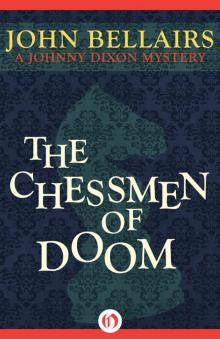 Chessmen of Doom
Chessmen of Doom Secret of the Underground Room
Secret of the Underground Room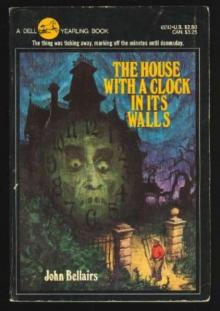 The House With a Clock in Its Walls
The House With a Clock in Its Walls The Vengeance of the Witch-Finder
The Vengeance of the Witch-Finder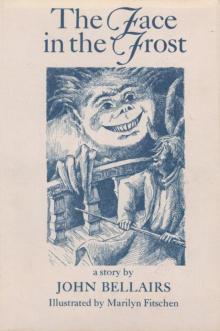 The Face in the Frost
The Face in the Frost Revenge of the Wizard's Ghost
Revenge of the Wizard's Ghost Spell of the Sorcerer's Skull
Spell of the Sorcerer's Skull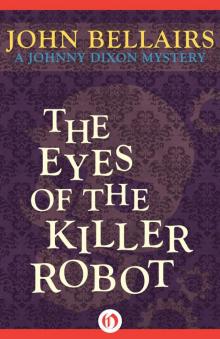 Eyes of the Killer Robot
Eyes of the Killer Robot Mummy, the Will, and the Crypt
Mummy, the Will, and the Crypt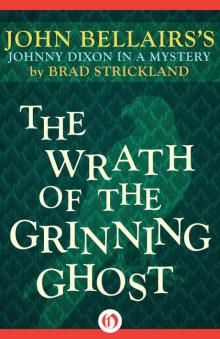 Wrath of the Grinning Ghost
Wrath of the Grinning Ghost The Mansion in the Mist
The Mansion in the Mist The Doom of the Haunted Opera
The Doom of the Haunted Opera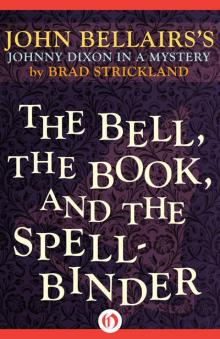 The Bell, the Book, and the Spellbinder
The Bell, the Book, and the Spellbinder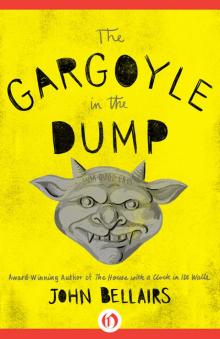 The Gargoyle in the Dump
The Gargoyle in the Dump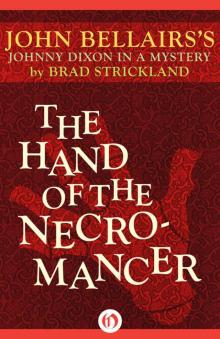 The Hand of the Necromancer
The Hand of the Necromancer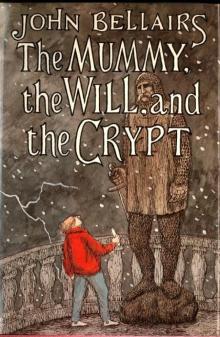 The Mummy, the Will, and the Crypt
The Mummy, the Will, and the Crypt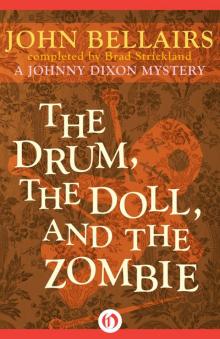 Drum, the Doll, and the Zombie
Drum, the Doll, and the Zombie The Specter from the Magician's Museum
The Specter from the Magician's Museum The Letter, the Witch, and the Ring
The Letter, the Witch, and the Ring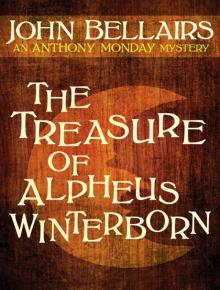 The Treasure of Alpheus Winterborn
The Treasure of Alpheus Winterborn The Dark Secret of Weatherend
The Dark Secret of Weatherend The Figure in the Shadows
The Figure in the Shadows